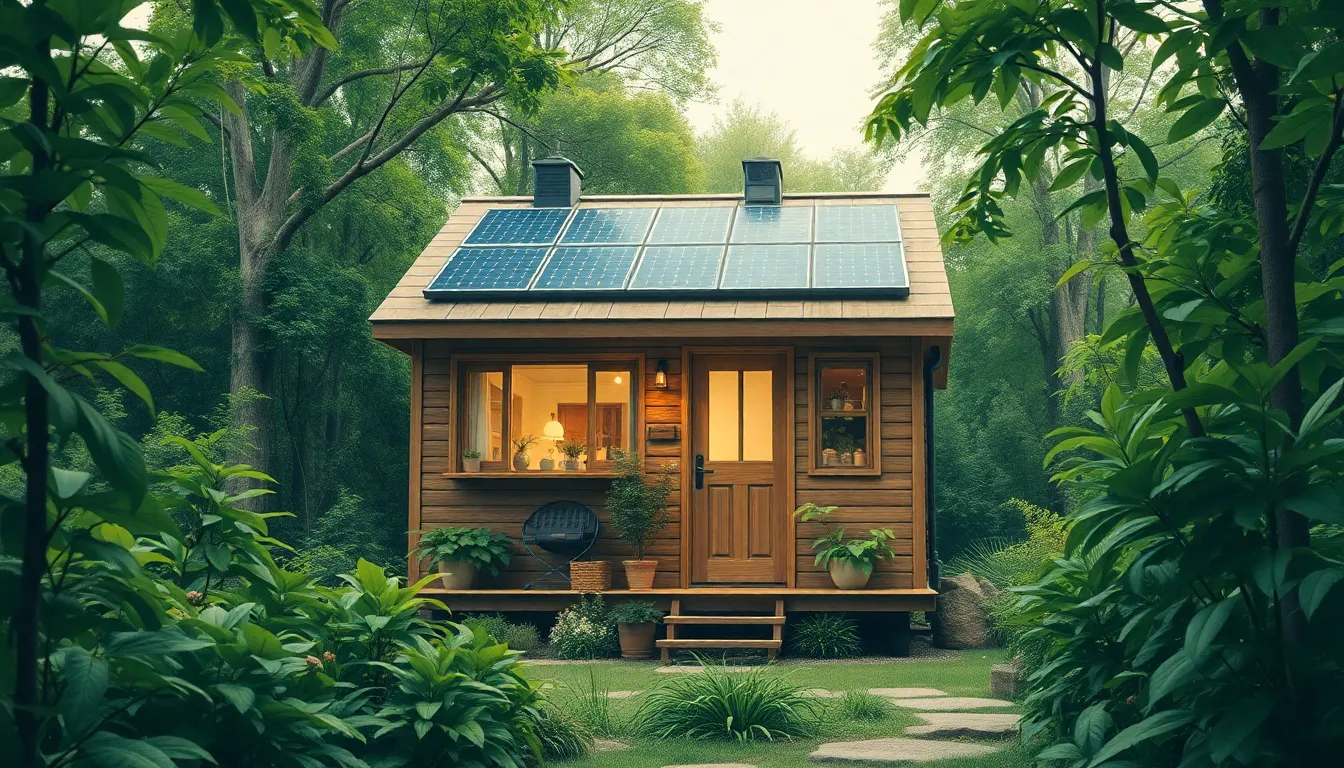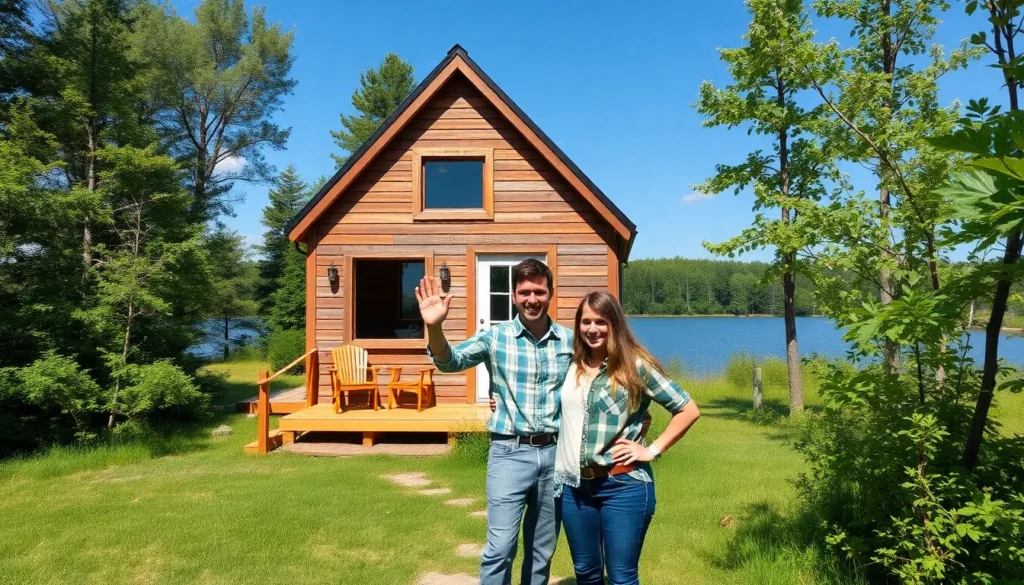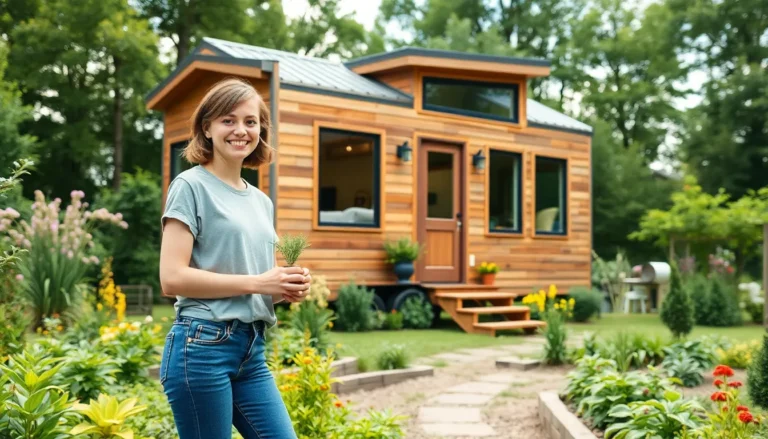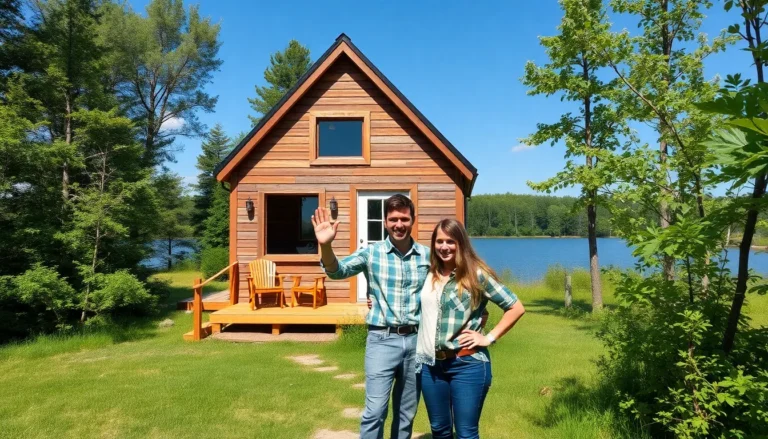Table of Contents
ToggleIn the land of 10,000 lakes, bigger isn’t always better. Enter the tiny home movement, where cozy meets clever and downsizing turns into a lifestyle upgrade. Imagine living in a space that’s not just a home but a charming retreat, all while saving money and reducing your carbon footprint. Sounds dreamy, right?
Overview of Tiny Homes
Tiny homes offer innovative solutions for modern living, emphasizing efficiency and simplicity. These compact structures typically range from 100 to 400 square feet, promoting a minimalist lifestyle. Designed for comfort, tiny homes maximize functionality through multi-purpose furniture and smart storage solutions.
In Minnesota, the popularity of tiny homes has surged due to their affordability and sustainability. Residents appreciate the potential for lower utility bills and reduced maintenance costs. Environmental considerations fuel interest in these homes, allowing homeowners to minimize their carbon footprint.
Communities across Minnesota have begun to embrace tiny home developments. Cohousing neighborhoods and tiny home parks create shared spaces, fostering a sense of community among residents. Builders often incorporate eco-friendly materials and energy-efficient appliances, aligning with sustainable living practices.
Variety exists in tiny home designs, catering to diverse tastes and needs. Styles range from modern to rustic, featuring customizable options for layout and finishes. Prospective buyers can find options that include mobile tiny homes on wheels, allowing for flexibility in location.
Tiny homes represent a smart choice for those seeking an alternative housing solution. They appeal to individuals and families looking for a cozy yet functional living space in Minnesota. With ongoing developments, the tiny home movement continues to gain momentum, making it a viable and attractive lifestyle choice.
Benefits of Tiny Living

Tiny living offers numerous advantages that attract individuals and families alike. Downsizing not only provides the opportunity for an affordable lifestyle but also fosters a unique way of living that emphasizes simplicity.
Financial Advantages
Tiny homes serve as a cost-effective housing solution. Monthly mortgage payments significantly decrease when choosing smaller spaces, often lower than traditional homes. Property taxes also tend to be lower due to reduced home value. Utility bills decrease substantially since tiny homes require less energy for heating and cooling. With fewer possessions, maintenance costs drop, allowing residents to allocate funds to experiences rather than material items.
Environmental Impact
Living in a tiny home positively influences the environment. Smaller homes consume fewer resources, resulting in reduced energy needs. Many tiny homes incorporate eco-friendly materials that minimize their carbon footprint. Additionally, residents often embrace sustainable practices, such as composting and rainwater collection. The shift toward tiny living also encourages a minimalist lifestyle, prompting individuals to think critically about their consumption patterns and promoting a greater connection with nature.
Popular Tiny Home Models
Tiny homes come in various styles, catering to diverse preferences and needs. Two popular categories include prefabricated options and custom-built tiny homes.
Prefabricated Options
Prefabricated tiny homes offer a quick and efficient solution for buyers. These homes come ready to assemble, reducing construction time and costs. Companies provide a variety of designs and layouts, ensuring options for different lifestyles. Many prefabricated models include energy-efficient features, which enhance sustainability. Examples of popular brands include Tumbleweed Tiny House Company and Escape Traveler, both known for their innovative designs. Additionally, the affordability of prefabricated homes attracts many Minnesotans looking for budget-friendly alternatives.
Custom-Built Tiny Homes
Custom-built tiny homes allow individuals to create a space that reflects their unique tastes. Buyers can choose layouts, materials, and finishes, ensuring a personal touch in every aspect of design. This option appeals to those seeking specific features, such as extra storage or eco-friendly materials. Builders often collaborate closely with clients, resulting in tailored solutions that maximize functionality. Prominent builders in Minnesota specialize in these custom designs, delivering high-quality craftsmanship. The result is a one-of-a-kind tiny home that meets all homeowners’ needs and preferences.
Where to Find Tiny Homes for Sale in MN
Finding tiny homes in Minnesota is easier than ever due to the growing popularity of the movement. Various resources and locations cater specifically to those searching for these compact living spaces.
Top MN Cities for Tiny Homes
Minneapolis and Saint Paul lead the list of cities witnessing an increase in tiny home interest. Brainerd offers charming lakeside options, attracting those seeking a retreat. Duluth presents stunning views along with a vibrant community. Rochester, known for its medical facilities, also features tiny homes perfect for a minimalist lifestyle. Each city provides unique amenities, creating a desirable environment for tiny home living.
Online Listings and Resources
Numerous online platforms list tiny homes for sale in Minnesota. Websites like Zillow and Realtor.com prominently feature tiny home listings. Tiny House Marketplace specializes in tiny homes, providing additional resources for buyers. Facebook groups unite enthusiasts, sharing tips and available properties. Local real estate agents focused on tiny homes can offer personalized assistance. These digital resources simplify the search process and connect potential buyers with their dream homes.
Financing Options for Tiny Homes
Financing tiny homes in Minnesota involves various pathways tailored to buyers’ needs. Understanding options helps ensure an informed purchase.
Traditional Loans vs. Alternative Financing
Traditional loans are accessible for many tiny home buyers, though they may require specific qualifications depending on the lender. Conventional mortgages often cater to larger homes, but some lenders offer loans designed for tiny living. Alternative financing options like personal loans, RV loans, or seller financing often provide more flexibility. Personal loans typically feature shorter terms and higher interest rates, while RV loans fit well with mobile tiny homes. Seller financing presents an opportunity where the seller directly loans funds to the buyer, streamlining the process. Ultimately, assessing both types helps buyers choose the best fit for their situation.
Tips for First-Time Buyers
First-time buyers should prioritize a budget for tiny home financing that reflects their lifestyle and goals. Researching different lenders helps identify those that specialize in tiny homes or alternative financing options. Clarifying one’s financial standing and credit score can strengthen loan applications, enhancing approval chances. It’s beneficial to consider additional costs like land purchase, utility connections, and insurance within the overall budget. Visiting tiny home communities or shows can provide insights and firsthand experiences, fostering informed decisions. Engaging with local experts or real estate agents can facilitate the process and reveal valuable resources, ensuring a smoother journey into tiny living.
Tiny homes in Minnesota offer a unique blend of affordability sustainability and community living. As more individuals and families embrace this lifestyle they find joy in downsizing and simplifying their lives. The movement not only caters to financial savings but also fosters a deeper connection with nature and the surrounding environment.
With various options available from prefabricated models to custom-built designs buyers can easily find a tiny home that suits their needs. The growing resources and communities dedicated to tiny living make it easier than ever to embark on this journey. For those considering a shift towards a more minimalist lifestyle tiny homes represent an exciting opportunity for both personal and financial growth.







